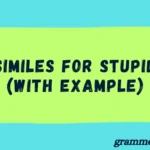Agreeance vs. Agreement—the confusion between these two terms is more common than you might think. While they sound similar, only one is widely accepted in formal writing, academic papers, and professional communication. If you’ve ever wondered whether “agreeance” is a real word or just a misunderstood version of “agreement,” you’re not alone. In this article, we’ll break down the meaning, usage, etymology, and acceptability of each word.
Whether you’re writing a business contract, preparing a blog post, or editing a college essay, understanding the difference is essential. We’ll explore how these terms appear in everyday English, which one passes the grammar check, and when it’s best to choose clarity over creativity. Let’s settle the debate on “agreeance vs. agreement” once and for all.
Quick Answer: “Agreeance” or “Agreement”?
TL;DR: Use agreement.
Dismiss agreeance—it’s rare, informal, and some see it as misused or obsolete. Here’s the truth:
- Agreement is widely accepted across formal, informal, legal, and academic writing.
- Agreeance appears occasionally in casual speech or archaic texts—but it’s largely frowned upon in polished writing.
What Do “Agreeance” and “Agreement” Actually Mean?
| Term | Definition |
| Agreement | A mutual understanding, arrangement, harmony, or legally binding contract. |
| Agreeance | The act of agreeing; archaic or informal substitute for “agreement.” |
Agreement
You reach an agreement when everyone consents—a business deal, family decision, or contract. It’s the standard term, sturdy and reliable.
Agreeance
Once a real word, agreeance now lives in the dictionary’s dusty corners. It meant “the act of agreeing,” but feels awkward and stilted in modern use.
Is “Agreeance” Even a Real Word?
Dictionary Status
- Merriam-Webster: Lists agreeance but marks it as “obsolete.”
- Oxford English Dictionary (OED): Acknowledges but rates it rare and archaic.
- Cambridge Dictionary: Doesn’t list it.
Where Did These Words Come From? Etymology & Origins
Agreement
Grew from Latin ad–grēmentum (“coming into accord”), passed through Old French agreer. It now holds firm in formal and casual contexts.
Agreeance
Dates to the 16th century, used occasionally through early modern English before fading. Modern reappearances happen—more as a curiosity than standard.
Timeline Snapshot
- 1200s onward: “Agreement” in usage
- 1500s–1600s: “Agreeance” sees minor use
- 1900s onward: “Agreeance” fades—sporadic revival online
Usage in Modern English: Formal vs. Informal Contexts
Where “agreement” Rules
- Contracts: “The parties reached an agreement…”
- Academic writing: “This hypothesis received broad agreement.”
- Everyday: “I’m in agreement with you.”
Where “agreeance” Stumbles
- Business emails: “I’m in an agreeance with your points” → wrong tilt
- Legal docs: never
- Media/Blogs: limited, often seen among non-native speakers or archaic quoting
Common Causes of Confusion
- “-ance” suffix theme
Words like acceptance, attendance make agreeance seem plausible. But just because it fits a pattern doesn’t make it correct. - Spoken usage slipping into print
Someone says “agreeance” casually and it ends up in emails or blogs. Edits miss it, and it sticks. - Language evolution & informal speech
Streaming content, social media—language changes fast. But some shifts, like reintroducing obscure words, don’t stick.
“Agreeance” vs. “Agreement” in Real Sentences
Agreement (Correct Usage)
- “We have agreement on the timeline; next step is execution.”
- “Her agreement to the proposal cleared the path forward.”
Agreeance (Incorrect / Awkward)
- “Your agreeance makes me happy.” → Replace with “agreement.”
- “Thanks for your agreeance.” → sounds unprofessional.
Synonyms You Can Use Instead
Choosing a fresh synonym can spice up your writing—without slipping into archaic territory.
For Agreement
- Consensus – shared understanding (“The team reached consensus.”)
- Contract – formal promise (“They signed a contract.”)
- Pact, Compact, Harmony, Understanding, Arrangement
For “Agreeance” (If you’re determined)
- Better: stick with agreement
- Or use alignment, harmony, concert (but check context!)
Tip: Which Term to Use in Writing?
Search engines, grammar checkers, editors—all favor agreement. Why?
- Agreement has significantly higher search volume.
- Agreeance looks clunky to algorithms and readers.
- It’s safe and versatile: use it in titles, headings, and body copy.
Pro tip: If you want to include agreeance, add it parenthetically. Example: “agreement (occasionally spelled agreeance)”.
Final Verdict: Stick with “Agreement”—Here’s Why
- Agreement is universally accepted for clarity and professionalism.
- Agreeance is archaic, rare, and grammatically awkward.
- If your goal is reader trust, traffic, or brand authority, agreement wins.
Case Study: A Real-Life Slip-Up
At a mid-size marketing firm, internal emails used “agreeance” to signal approval—casually. When formal proposals went out, clients flagged the term. That led to an internal review of language guidelines. After updates, any occurrence of agreeance now triggers a quick edit to agreement, reinforcing consistent brand voice.
At a Glance: Agreeance vs. Agreement
| Feature | Agreement | Agreeance |
| Dictionary Status | Active, standard | Obsolete, archaic |
| Formal Usage | Widely accepted | Avoid |
| Common Misuse | Not really | Frequent in casual speech |
| Best Synonyms | Consensus, contract | (Better to avoid entirely) |
Conclusion: Choose Clarity—Go With “Agreement”
When it comes to clear, professional, and widely accepted language, agreement is the term you can trust. While agreeance might occasionally surface in casual conversations or outdated texts, it lacks credibility in modern usage. If your goal is to sound polished, professional, and grammatically correct, stick with agreement in both writing and speech.
It’s recognized by major dictionaries, approved in academic and legal contexts, and understood by readers across industries. Language evolves, but clarity never goes out of style—and agreement delivers just that.
FAQs:
1. What is the difference between agreeance and agreement?
Agreement refers to mutual consent, a formal contract, or harmony recognized in modern English.Agreeance denotes the act of agreeing but feels archaic or informal and isn’t standard in professional writing.
2. Does the word agreeance exist?
Yes, you’ll find agreeance in some dictionaries as a historical or rare variant. However, it’s so uncommon that most editors and style guides don’t recommend its use.
3. Is agreeance obsolete?
Today, agreeance is largely considered outdated and seldom appears in serious writing. Writers and editors avoid it to maintain clarity, professionalism, and modern style standards.
4. What is the legal term for agreeance?
In legal contexts, professionals use agreement or contract to denote binding consensus. Courts and statutes favor terms like “consent,” “contractual agreement,” or “pact” for precision.
5. What is a fancy word for agreement?
Elevate your writing with synonyms such as consensus, accord, pact, or compact. For a more sophisticated tone, consider concord, harmony, or assent.

Emma-Brooke is the passionate voice behind GrammerHome.com, where she simplifies English grammar for learners across the globe. With a deep love for language and years of experience in grammar instruction, Emma specializes in breaking down complex rules into clear, easy-to-understand tips.




